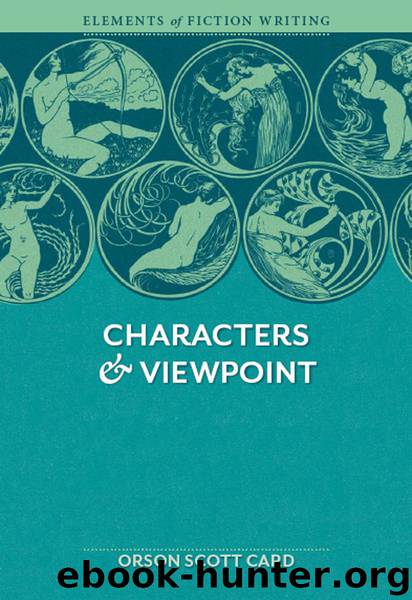Elements of Fiction Writing by Orson Scott Card

Author:Orson Scott Card
Language: eng
Format: mobi, epub
Tags: ebook, epub
Publisher: F+W Media, Inc.
Published: 2010-11-21T05:00:00+00:00
CHAPTER NINE
THE HERO AND THE COMMON MAN
When the ancient Greeks and Romans told a serious story, the characters were kings and queens, great warriors and heroes, the sort of people who expected to receive visitations from the gods — heck, the gods were often their aunts and cousins anyway. But when the Greeks and Romans set out to tell a story about common everyday people, the result was comedy, in which the characters were lewd and foolish and corrupt.
It was long believed that great poetry could never be written about low characters — magnificent art demanded magnificent subject matter. The rules have changed since then. The invention of the novel — with such landmarks in English as Pamela, Tom Jones, Robinson Crusoe, and Tristram Shandy — proved that wonderful stories could take common people seriously.
Oddly enough, however, storytelling keeps drifting toward extraordinary heroes, so that the common people have to be rediscovered every few decades or so. Noted critic Northrop Frye examined this pattern and came up with the idea that our preference in fictional heroes swings back and forth like a pendulum. Frye used the words realistic and romantic in a special way, as the two ends of a descriptive spectrum. Romantic, in this context, doesn’t have anything to do with whether or not a character is in love. At first, heroes become more and more romantic (idealized, extraordinary, exotic, magnificent) until finally they become so overblown and so cliched that we cease to believe in or care about them. In reaction, the pendulum swings back the other way, and our fictional heroes become realistic — common, plain people living lives that are well within the experience of the readers. However, these realistic heroes quickly become boring, because people who live lives no different from our own are not terribly interesting to read about — or to write about. So storytellers almost immediately begin making their heroes just a little out of the ordinary, so that readers will again be fascinated — until the romantic hero is in the saddle again.
In creating characters, we don’t have to worry about pendulums. What concerns us is that our main characters must be at once believable and interesting — simultaneously realistic and romantic. Each of us, however, finds a different balance between the two. How extraordinary or exotic or “elevated” do characters need to be for you to want to read or write about them? How much detail, how much commonness, how much familiarity must characters have before you believe in them? Your answer will be different from mine and from every other writer’s; your audience will consist of readers who agree with your answer.
Look at the fiction market today, and you’ll see what I mean. Do you want romantic characters? Thrillers deal with people who are on the cutting edge of power in the world — spies, diplomats, heads of state — and their lives are never ordinary; even shopping for groceries, they have to watch out for the enemy. Historical
Download
Elements of Fiction Writing by Orson Scott Card.epub
This site does not store any files on its server. We only index and link to content provided by other sites. Please contact the content providers to delete copyright contents if any and email us, we'll remove relevant links or contents immediately.
Asking the Right Questions: A Guide to Critical Thinking by M. Neil Browne & Stuart M. Keeley(5755)
Autoboyography by Christina Lauren(5226)
Eat That Frog! by Brian Tracy(4519)
Dialogue by Robert McKee(4386)
Sticky Fingers by Joe Hagan(4188)
Journeys Out of the Body by Robert Monroe(3615)
Annapurna by Maurice Herzog(3464)
Full Circle by Michael Palin(3443)
Schaum's Quick Guide to Writing Great Short Stories by Margaret Lucke(3369)
Elements of Style 2017 by Richard De A'Morelli(3339)
The Art of Dramatic Writing: Its Basis in the Creative Interpretation of Human Motives by Egri Lajos(3058)
Atlas Obscura by Joshua Foer(2952)
Why I Write by George Orwell(2944)
The Diviners by Libba Bray(2927)
The Fight by Norman Mailer(2926)
In Patagonia by Bruce Chatwin(2919)
The Mental Game of Writing: How to Overcome Obstacles, Stay Creative and Productive, and Free Your Mind for Success by James Scott Bell(2897)
Venice by Jan Morris(2568)
The Elements of Style by William Strunk and E. B. White(2470)
